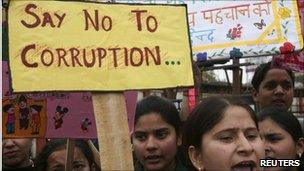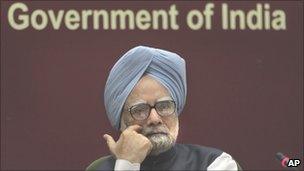Corruption 'threatens India's economic growth'
- Published

The report says that corruption may result in a volatile political and economic environment
Widespread corruption in India costs billions of dollars and threatens to derail the country's growth, a survey says.
The report by consultancy firm KMPG said that the problem had become so endemic that foreign investors were being deterred from the country.
It was compiled by questioning 100 top domestic and foreign businesses.
Its release comes as Prime Minister Manmohan Singh struggles to cope in the battle against corruption.
Earlier this month the head of the country's anti-corruption watchdog was forced to resign by the Supreme Court on the grounds that he himself faces corruption charges.
Over the last six months India has been hit by a series of corruption scandals including a multi-billion dollar telecoms scandal, alleged financial malpractices in connection with the Commonwealth Games and allegations that houses for war widows were diverted to civil servants.
Mega scams
"Today India is faced with a different kind of challenge," the report, external said.
"It is not about petty bribes (bakshish) any more, but scams to the tune of thousands of crores (billions of rupees) that highlight a political/industry nexus which, if not checked, could have a far reaching impact.

Corruption scandals have weighed heavily on Mr Singh's shoulders
"Corruption poses a risk to India's projected 9% GDP growth and may result in a volatile political and economic environment."
Critics of the government say that recent scandals point to a pervasive culture of corruption in Mr Singh's administration - adding to the difficulties of a politician once seen as India's most honest.
The government denies the claims and has set up a parliamentary inquiry into corruption.
The BBC's Sanjoy Majumder in Delhi says that most Indians routinely pay bribes for a number of services such as getting a driver's licence or a passport.
But, our correspondent says, the KPMG survey makes clear that corruption is now no longer about such petty bribes but mega scams where billions of dollars are siphoned off by government and industry.
The worst-hit areas as identified by the report were real estate and construction - a priority for Delhi which plans to spend $1.5tn over the next decade to improve its over-burdened infrastructure.
The report said that the country's telecommunications industry was also badly affected.
Telecoms Minister Andimuthu Raja resigned in November, denying allegations that he had undersold billions of dollars worth of mobile phone licences. He is now under arrest.
However the KMPG report was not all gloomy. It said that despite the murky regulatory environment, business remained active in India with more than half of those surveyed saying they were unaffected by corruption.
More than 80% of respondents disagreed that corruption had reduced their ability to access domestic or foreign funds, while 55% disagreed that corruption had affected their business.
- Published3 March 2011
- Published20 January 2011
- Published18 January 2011
- Published18 November 2010